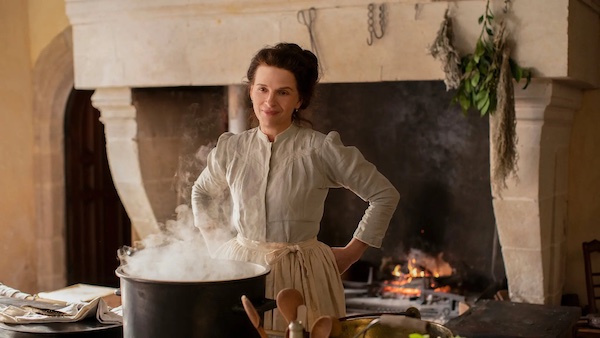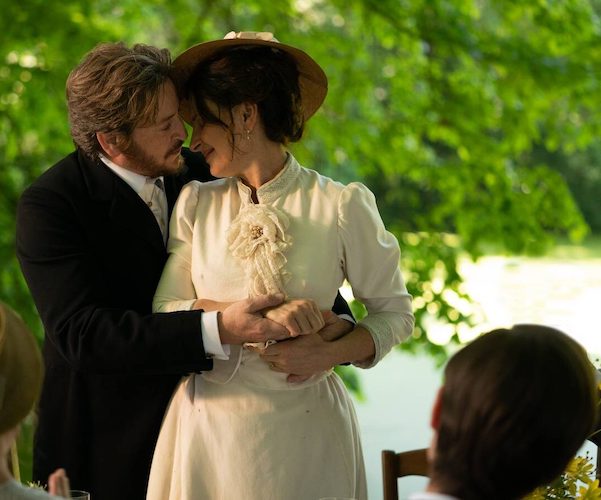Film Review: “The Taste of Things” – Gallic Feasts for the Eyes
By Ed Symkus
A 100-year-old novel provides the basis for some sumptuous moviegoing.
The Taste of Things, written and directed by Trân Anh Hùng. Screening at Alamo Drafthouse Cinema, Coolidge Corner Theatre, AMC Boston Common, and West Newton Cinema.

Juliette Binoche as Eugenie in The Taste of Things.
I’ve not read Marcel Rouff’s 1924 food-driven French novel La vie et la passion de Dodin-Bouffant, gourmet, and I’d never heard of the 18th-century French politician, epicure, and apparent ladies’ man Anthelme Brillat-Savarin, upon whom the protagonist Dodin was “loosely based.” But I have now seen the film adaptation, The Taste of Things — the novel’s prequel, of sorts — twice.
Short on dialogue and storyline, but immense in atmosphere and emotional resonance, the film — set in the late 1800s — is about love and loss and longing … and food, glorious food. Of course, there is more going on than just contemplating what’s for dinner: Dodin (Benoît Magimel) is a wealthy man of leisure who is in love with food, its preparation and consumption. And he’s in love with Eugénie (Juliette Binoche), his longtime live-in cook, who is also in love with food and with Dodin. Yet, for undetermined reasons, she has been rebuffing his marriage proposals for years.
Dodin has a group of well-to-do gentleman friends who take turns hosting opulent multicourse meals, replete with the aptly selected bottles of wine, during which they discuss history and politics. And, of course, they always tie their conversations in with what’s on their plates.
There’s also Violette (Galatéa Bellugi), an assistant to Eugénie who is rumored to have difficulty boiling water, and Pauline (Bonnie Chagneau-Ravoire), a doe-eyed young neighbor who is welcomed into the household in order to train as a kitchen apprentice.
Every character in The Taste of Things is a member of the “live to eat” (as opposed to the “eat to live”) camp. That fact is firmly established in the conversations the men have at their meals. Dodin proves to be a skillful teacher, mentoring Pauline in how to master his ideas and practices in the kitchen. In a wonderful sequence, he instructs her on the ingredients that make for the perfect bourguignon sauce, making sure she knows not to forget the currant jelly.

Benoît Magimel as Dodin and Juliette Binoche as Eugénie in The Taste of Things.
But it’s the plentiful, near-wordless scenes that make the film stand out. The exquisite visuals (Jonathan Ricquebourg was honored for his cinematography by the Boston Society of Film Critics) continually draw the viewer in. The absence of music (except for a bit of Massenet in the end credits) focuses your attention to the carefully designed aural atmosphere. This impressive soundscape includes the birds, insects, and farm animals that are heard, but never seen, through open windows; the percussive clanging of pots and pans and cooking utensils in the spacious, always busy kitchen as meals are taking elegant shape; and, of course, the sighs of satisfaction expressed by delighted diners.
The Taste of Things features flawlessly understated performances from the two leads. Eventually, the script gets around to explaining the complicated personal relationship between Dodin and Eugénie – remember, this is a love story. But the preparing, serving, presentation, and especially the enjoyment of food overwhelms the plot’s side dish of romance. Yes, the camera meticulously follows the mechanics of how meals are created, but the vittles are always the stars, and they are given plenty of lingering and adoring close-ups. Garbo would be jealous.
Writer-director Trân Anh Hùng (The Scent of Green Papaya) has a subtle sense of humor, goes at health issues in unpredictable ways, and even slings a serving of tragedy. Yet The Taste of Things is infused with a reassuring feeling of calmness. The film, which won Hùng the Best Director prize at last year’s Cannes Film Festival, might not give your tummy hunger pangs, but it will leave you happy and sad and content and warm inside.
Ed Symkus is a Boston native and Emerson College graduate. He went to Woodstock, interviewed Herb Alpert, Bob Denver, Julie Andrews, and Vince McMahon Jr., and has visited the Outer Hebrides, the Lofoten Islands, Anglesey, Mykonos, the Azores, Catalina, Kangaroo Island, Capri, and the Isle of Wight with his wife Lisa.
